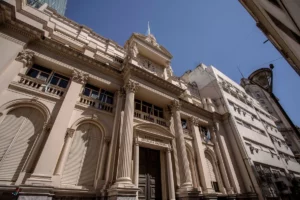Argentina aims to boost its central bank’s net international reserves by $10 billion this year, as per its IMF agreement.
Post-drought agricultural recovery could aid this, yet JPMorgan & Chase flag import debts and sovereign dues as limitations.
The bank reports that without fresh external funds, reserve growth faces challenges.
Argentina owes about $4.9 billion in hard currency debt this year, including $1.6 billion in bond interest and $2.8 billion to international lenders paid in January.
The Treasury must cover $3.9 billion, with $2.7 billion due to bondholders on July 9 and $1.2 billion to the IMF and others.

Additionally, the BCRA will start monthly repayments of $1 billion for the Bopreal bond’s Series 2 in July.
JPMorgan also expects the renewal of a $5 billion swap with China’s bank.
Analysts warn that easing capital controls could strain financial flows from both profit remittance and decreased reinvestment.
Since Javier Milei’s presidency, the Central Bank has net-bought $8.667 billion in the forex market.
Yet, JPMorgan estimates net reserves at about $7.4 billion, factoring in Bopreal bond obligations.
Reserve Gain Projection and Economic Outlook
Despite obstacles, JPMorgan predicts a net $10 billion reserve gain in 2023, meeting the IMF’s goal.
This 2% GDP boost remains modest. Future capital control removal and market unification could be challenging, but they are seen as essential for 2025–26’s reserve replenishment.
This outlook assumes $31 billion from agricultural exports, contributing to a projected $79 billion in total exports, a $13 billion rise from 2023.
Import costs should fall to $55 billion following slight exchange adjustments and an economic slowdown.
JPMorgan highlights that the current import payment system, allowing only 25% of imports to be paid a month later, significantly affects reserve building.
The interplay of financial policies, international commitments, and economic strategies shapes Argentina’s fiscal health and reserve accumulation efforts.

